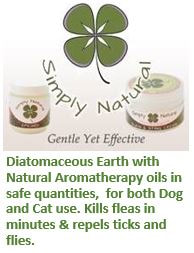Are Essentials Oils Good for Dogs & Cats?
Dr. Natalie Wagner - South Boston Animal Hospital
(Dr. Wagner has some great articles on her site, and if we lived in the South Boston area, would definitely
consider using them!)
Dr. Natalie Wagner - South Boston Animal Hospital
(Dr. Wagner has some great articles on her site, and if we lived in the South Boston area, would definitely
consider using them!)

For Dr. Richard Palmquist, Chief of Integrative Health Services at Centinela Animal Hospital in Inglewood California, it was one of those serendipitous moments.
Dr. Palmquist had taken his Chihuahua puppy outside early one morning when he was overwhelmed by the scent of jasmine and eucalyptus oil in the air. It filled him with joy. It also seemed to affect the usually excitable puppy, who was suddenly calm and compliant, running over to him and happily licking his nose.
The Benefits of Essential Oils
Dr. Palmquist's scientific bent was aroused by his dog's seeming reaction to the aromas which filled the air that morning, so he decided to delve deeper into the effects of essential oils on dogs. Through careful research, he discovered that essential oils can be a beneficial alternative therapy for pets, noting that:
"Oils have been shown to have many possible desirable effects such as reducing anxiety and inflammation, fighting oxidative processes, battling toxins and fighting infections by inhibiting bacteria, fungi and viruses. Oil odors can also be used to affect mental states and memory. Modern doctors are looking for agents that will assist in management of resistant infections and cancer, and these natural products may well hold the key to several major advancements."
What Are Essential Oils, and Are They Effective?
Various species of plants produce aromatic oils to neutralize potential threats, like those posed by predators and infectious pathogens. Essential oils achieve this result when they are inhaled, ingested or have contact with the skin.
The same properties which neutralize plant predators and pathogens can have a strong effect on humans and animals, including your cat or dog. When inhaled, they quickly enter the bloodstream and are distributed throughout the body. Different essential oils impact different tissues and organs.
For example, a recent study published by the National Institutes of Health looked at the affects of lavender oil on the central nervous system in 20 test subjects. Researchers found that exposure to lavender oil caused a substantial decrease in blood pressure, heart rate and skin temperature. Test subjects also reported an elevation of their mood, stating they were more active, fresher and relaxed because of inhaling the oil's aroma.
Dr. Palmquist had taken his Chihuahua puppy outside early one morning when he was overwhelmed by the scent of jasmine and eucalyptus oil in the air. It filled him with joy. It also seemed to affect the usually excitable puppy, who was suddenly calm and compliant, running over to him and happily licking his nose.
The Benefits of Essential Oils
Dr. Palmquist's scientific bent was aroused by his dog's seeming reaction to the aromas which filled the air that morning, so he decided to delve deeper into the effects of essential oils on dogs. Through careful research, he discovered that essential oils can be a beneficial alternative therapy for pets, noting that:
"Oils have been shown to have many possible desirable effects such as reducing anxiety and inflammation, fighting oxidative processes, battling toxins and fighting infections by inhibiting bacteria, fungi and viruses. Oil odors can also be used to affect mental states and memory. Modern doctors are looking for agents that will assist in management of resistant infections and cancer, and these natural products may well hold the key to several major advancements."
What Are Essential Oils, and Are They Effective?
Various species of plants produce aromatic oils to neutralize potential threats, like those posed by predators and infectious pathogens. Essential oils achieve this result when they are inhaled, ingested or have contact with the skin.
The same properties which neutralize plant predators and pathogens can have a strong effect on humans and animals, including your cat or dog. When inhaled, they quickly enter the bloodstream and are distributed throughout the body. Different essential oils impact different tissues and organs.
For example, a recent study published by the National Institutes of Health looked at the affects of lavender oil on the central nervous system in 20 test subjects. Researchers found that exposure to lavender oil caused a substantial decrease in blood pressure, heart rate and skin temperature. Test subjects also reported an elevation of their mood, stating they were more active, fresher and relaxed because of inhaling the oil's aroma.
"Essential oils have potential therapeutic benefits for your pets—but it's important to check with your vet before using them."
|
Which Essential Oils Have Been Beneficial for Pets?
Several essential oils have shown great promise in treating a wide range of medical conditions in pets. It's important to note, however, that oils should only be used in consultation with your family veterinarian. Some oils, for example, contain contaminates or adulterants which could have adverse effects, some of which are noted below. That said, the following essential oils have had positive therapeutic effects: |
- Lavender oil: As noted above, lavender oil can have profound effects on the central nervous system. As the busy holiday season approaches, pet owners should consider using lavender oil to reduce stress and produce a calming effect. Lavender oil has also been helpful with allergies, burns, ulcers and insomnia.
- Cardamom oil: This has been used for anti-bacterial purposes, as well as to help with colic, coughs, nausea, heartburn, and as a diuretic.
- Fennel oil: Fennel seems to assist the adrenal cortex, balance the pituitary, thyroid and pineal glands, and break up toxins.
- Helichrysum oil: Like cardamom, this acts as an anti-bacterial agent. It also regenerates skin, helps repair nerves and has been promising in the treatment of cardiac disease.
- Frankincense: Frankincense boosts the immune system and, as such, has been beneficial in reducing tumors and external ulcers. It also appears to increase blood flow to the brain.
- Spearmint oil: Spearmint oil has been useful in weight control, as well as in treating colic, diarrhea and nausea. It also helps balance the metabolism and stimulate the gall bladder. Finally, spearmint has been useful treating some gastrointestinal issues in cats.
Always Work with Your Veterinarian
There are probably as many myths about the benefits of essential oils as there are facts, and it's important to know the difference. If used improperly, essential oils can have adverse effects on your cat or dog, which is why you should never use them without first consulting your vet. For example, oils must be obtained from reputable sources, and they should be properly diluted to avoid a potential overdose. In addition, some essential oils can lead to liver and kidney toxicity, and some are good for dogs, but not for cats.
|
Most of us know Tumeric as a herb that can be used in cooking, not as one that has so many uses for helping our dogs!
|
Find out exactly what can go wrong if you buy your pup via the internet - scary!
|
As our dogs age, some of the changes will be normal changes due to the aging process, others may be indicative of disease. To be more easily alerted to possible signs of disease early in the disease process:
|





